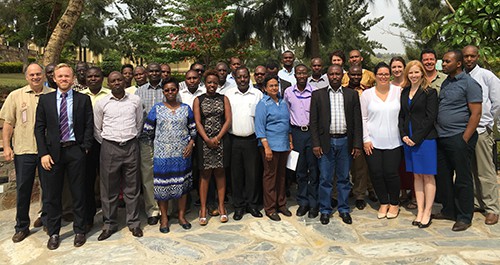Policy Roundtables in Rwanda Foster Dialogue Among Coffee Sector Stakeholders
Over the last 18 months, AGLC has offered a series of 10 policy roundtables to improve the capacity of the Rwandan government to implement evidence-based policies supporting the coffee sector.
By AGLC team
 Over the last 18 months, AGLC has offered a series of 10 policy roundtables to improve the capacity of the Rwandan government to implement evidence-based policies supporting the coffee sector.
Over the last 18 months, AGLC has offered a series of 10 policy roundtables to improve the capacity of the Rwandan government to implement evidence-based policies supporting the coffee sector.
Photo: Roundtable participants, Kigali, Rwanda, March 2017
A fundamental contradiction in the existing system is that coffee cherry prices and coffee productivity in the region are among the lowest in the world, yet the international buyers consistently rate Rwanda coffees among the very best. Rwanda is in a downward spiral of low farmer investment, declining/stagnant and fluctuating yields, and an increasing incidence of antestia/PTD disease. The goal of the public and private coffee sector stakeholders is to reverse the trend. The AGLC roundtables facilitated research finding presentations to support an open, evidence-based dialogue around these issues.
Each policy roundtable lasted four hours with 15 – 20 participants literally sitting around a large conference table, thus enabling discussion and engagement. The first hour was dedicated to a presentation of data from the field research of the AGLC project, which included baseline and midline household surveys, focus groups and key informant interviews. The participants would engage in a facilitated discussion of the topic, often culminating with notes on flipcharts and a “vote” from participants to identify priorities.
WHO
Four project partners created the alliance that would develop this collaborative nexus: From the US, Michigan State University (MSU) and Global Knowledge Institute (GKI); from Rwanda, the Institute for Policy Analysis and Research (IPAR) and the University of Rwanda (UR). IPAR and GKI both provided expert leadership for the series of roundtables. IPAR, a private policy research institute, has extensive experience leading policy dialogue, debate and deliberative forums to inform policy in Rwanda. GKI, as a Washington D.C.-based non-governmental organization, has track record of designing and implementing impactful, community-wide stakeholder workshops and high-level working meetings across the developing world. In the case of these roundtables, GKI focused on discussion facilitation after each presentation and translated results and recommendations into transparent, actionable inputs for policy reform and program development/improvement.
The participants in the roundtables were always by “invitation only” guests. The mix for each roundtable was designed to represent a broad cross-section of the coffee sector and the organizations that would have key influence on policy for each topic. For example, for the roundtable on cooperatives, the Rwanda Cooperative Agency was invited, as well as the relevant person from the Ministry of Agriculture (MINAGRI). The National Agricultural Export Development Board (NAEB) was invited to all policy roundtables and every effort was made to have individuals representing farmers and exporters at each workshop. Private sector contributing partners to program were always invited, also (e.g. CEPAR, Starbucks, Agropy).
TOPICS
- Premium Payments (Kigali, May 2016, Dan Clay)
- Motivating Farmers to Invest in their Coffee Plantation (Kigali, May 2016, Dan Clay)
- Improving access to pre-financing for cooperatives and coffee washing stations (Kigali, May 2016, David Ortega)
- Ensuring Higher Proportion of Coffee Moves Through the Fully Washed Channel (Kigali, May 2016, David Ortega)
- Ensuring Farmers Have Timely Access to Improved Inputs (Kigali, May 2016, Daniel T. Rukazambuga)
- Long-term Sustainability in Rwanda’s coffee sector (Kigali, March 2017, Dan Clay)
- Initial Observations on the Effects of Geographical Zoning in Rwanda’s Coffee Sector (Kigali, June 2017, Andrew Gerard)
- Ensuring Improvements to Input Delivery and Antestia Control (Kigali, June 2017, Katie Bowman)
- Challenges and Opportunities for Women in Rwandan Coffee Sector (Kigali, June 2017, Maria Claudia Lopez)
- Designing Mechanisms that Connect Coffee Price to Quality (Kigali, June 2017, Ruth Ann Church)
Via the roundtables, coffee sector decision-makers were engaged in evidence-based discussions about current regulations and potential future options to address high stake issues. Roundtables allow to disseminate research findings that can guide policy and industry activities. They also give critical local context to the data and help researchers better understand the implications of the research results.
Outputs and Impact
Sharing the research insights via facilitated discussion has already proven influential on policy reforms. In addition, with the input gathered from stakeholders, the project team is better able to develop and disseminate policy briefs and reports that inform and support all participants in the coffee sector. The documents (outreach presentations, backgrounders, policy briefs and reports) related to the policy roundtable series are all available on this website.
The impact of these policy engagement outputs will be felt region-wide by 350,000 coffee producers and their families who will benefit from the policy changes. A more conducive policy environment will elevate incentives for farmers to adopt best practices and invest their labor, land and cash resources in their coffee fields. These are the investments that will lead to higher-order outcomes such as improved coffee yields, reduced incidence of PTD disease, and higher and more stable incomes from coffee sales, all of which will have a positive impact on food security and health indicators. At the business, community, sector, and national levels, the economic growth and trade stimulated by a strong and vibrant coffee sector will add revenues to national GDPs and spill over into growth in other areas.



 Print
Print Email
Email




